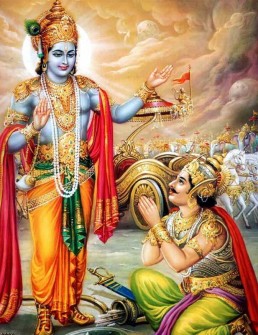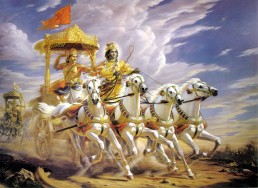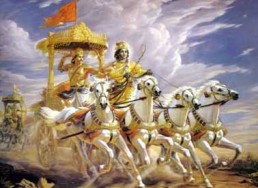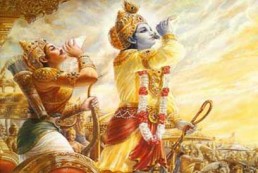Bhagavad Gita-Chapter 11 All Verses with Meaning and Audio
मदनुग्रहाय परमं गुह्यमध्यात्मसंज्ञितम् ।
यत्त्वयोक्तं वचस्तेन मोहोऽयं विगतो मम ॥ ११-१॥
madanugrahāya paramaṃ guhyamadhyātmasaṃjñitam
yattvayoktaṃ vacastena moho’yaṃ vigato mama 11-1
त्वत्तः कमलपत्राक्ष माहात्म्यमपि चाव्ययम् ॥ ११-२॥
tvattaḥ kamalapatrākṣa māhātmyamapi cāvyayam 11-2
द्रष्टुमिच्छामि ते रूपमैश्वरं पुरुषोत्तम ॥ ११-३॥
draṣṭumicchāmi te rūpamaiśvaraṃ puruṣottama 11-3
योगेश्वर ततो मे त्वं दर्शयात्मानमव्ययम् ॥ ११-४॥
yogeśvara tato me tvaṃ darśayātmānamavyayam 11-4
पश्य मे पार्थ रूपाणि शतशोऽथ सहस्रशः ।
नानाविधानि दिव्यानि नानावर्णाकृतीनि च ॥ ११-५॥
paśya me pārtha rūpāṇi śataśo’tha sahasraśaḥ
nānāvidhāni divyāni nānāvarṇākṛtīni ca 11-5
बहून्यदृष्टपूर्वाणि पश्याश्चर्याणि भारत ॥ ११-६॥
bahūnyadṛṣṭapūrvāṇi paśyāścaryāṇi bhārata 11-6
मम देहे गुडाकेश यच्चान्यद् द्रष्टुमिच्छसि ॥ ११-७॥
mama dehe guḍākeśa yaccānyad draṣṭumicchasi 11-7
दिव्यं ददामि ते चक्षुः पश्य मे योगमैश्वरम् ॥ ११-८॥
divyaṃ dadāmi te cakṣuḥ paśya me yogamaiśvaram 11-8
एवमुक्त्वा ततो राजन्महायोगेश्वरो हरिः ।
दर्शयामास पार्थाय परमं रूपमैश्वरम् ॥ ११-९॥
evamuktvā tato rājanmahāyogeśvaro hariḥ
darśayāmāsa pārthāya paramaṃ rūpamaiśvaram 11-9
अनेकदिव्याभरणं दिव्यानेकोद्यतायुधम् ॥ ११-१०॥
anekadivyābharaṇaṃ divyānekodyatāyudham 11-10
सर्वाश्चर्यमयं देवमनन्तं विश्वतोमुखम् ॥ ११-११॥
sarvāścaryamayaṃ devamanantaṃ viśvatomukham 11-11
यदि भाः सदृशी सा स्याद्भासस्तस्य महात्मनः ॥ ११-१२॥
yadi bhāḥ sadṛśī sā syādbhāsastasya mahātmanaḥ 11-12
अपश्यद्देवदेवस्य शरीरे पाण्डवस्तदा ॥ ११-१३॥
apaśyaddevadevasya śarīre pāṇḍavastadā 11-13
प्रणम्य शिरसा देवं कृताञ्जलिरभाषत ॥ ११-१४॥
praṇamya śirasā devaṃ kṛtāñjalirabhāṣata 11-14
पश्यामि देवांस्तव देव देहे
सर्वांस्तथा भूतविशेषसङ्घान् ।
ब्रह्माणमीशं कमलासनस्थ-
मृषींश्च सर्वानुरगांश्च दिव्यान् ॥ ११-१५॥
paśyāmi devāṃstava deva dehe
sarvāṃstathā bhūtaviśeṣasaṅghān
brahmāṇamīśaṃ kamalāsanastha-
mṛṣīṃśca sarvānuragāṃśca divyān 11-15
पश्यामि त्वां सर्वतोऽनन्तरूपम् ।
नान्तं न मध्यं न पुनस्तवादिं
पश्यामि विश्वेश्वर विश्वरूप ॥ ११-१६॥
paśyāmi tvāṃ sarvato’nantarūpam
nāntaṃ na madhyaṃ na punastavādiṃ
paśyāmi viśveśvara viśvarūpa 11-16
तेजोराशिं सर्वतो दीप्तिमन्तम् ।
पश्यामि त्वां दुर्निरीक्ष्यं समन्ताद्
दीप्तानलार्कद्युतिमप्रमेयम् ॥ ११-१७॥
tejorāśiṃ sarvato dīptimantam
paśyāmi tvāṃ durnirīkṣyaṃ samantād
dīptānalārkadyutimaprameyam 11-17
त्वमस्य विश्वस्य परं निधानम् ।
त्वमव्ययः शाश्वतधर्मगोप्ता
सनातनस्त्वं पुरुषो मतो मे ॥ ११-१८॥
tvamasya viśvasya paraṃ nidhānam
tvamavyayaḥ śāśvatadharmagoptā
sanātanastvaṃ puruṣo mato me 11-18
अनन्तबाहुं शशिसूर्यनेत्रम् ।
पश्यामि त्वां दीप्तहुताशवक्त्रं
स्वतेजसा विश्वमिदं तपन्तम् ॥ ११-१९॥
anantabāhuṃ śaśisūryanetram
paśyāmi tvāṃ dīptahutāśavaktraṃ
svatejasā viśvamidaṃ tapantam 11-19
व्याप्तं त्वयैकेन दिशश्च सर्वाः ।
दृष्ट्वाद्भुतं रूपमुग्रं तवेदं
लोकत्रयं प्रव्यथितं महात्मन् ॥ ११-२०॥
vyāptaṃ tvayaikena diśaśca sarvāḥ
dṛṣṭvādbhutaṃ rūpamugraṃ tavedaṃ
lokatrayaṃ pravyathitaṃ mahātman 11-20
केचिद्भीताः प्राञ्जलयो गृणन्ति ।
स्वस्तीत्युक्त्वा महर्षिसिद्धसङ्घाः
स्तुवन्ति त्वां स्तुतिभिः पुष्कलाभिः ॥ ११-२१॥
kecidbhītāḥ prāñjalayo gṛṇanti
svastītyuktvā maharṣisiddhasaṅghāḥ
stuvanti tvāṃ stutibhiḥ puṣkalābhiḥ 11-21
विश्वेऽश्विनौ मरुतश्चोष्मपाश्च ।
गन्धर्वयक्षासुरसिद्धसङ्घा
वीक्षन्ते त्वां विस्मिताश्चैव सर्वे ॥ ११-२२॥
viśve’śvinau marutaścoṣmapāśca
gandharvayakṣā surasiddhasaṅghā
vīkṣante tvāṃ vismitāścaiva sarve 11-22
महाबाहो बहुबाहूरुपादम् ।
बहूदरं बहुदंष्ट्राकरालं
दृष्ट्वा लोकाः प्रव्यथितास्तथाहम् ॥ ११-२३॥
mahābāho bahubāhūrupādam
bahūdaraṃ bahudaṃṣṭrākarālaṃ
dṛṣṭvā lokāḥ pravyathitāstathāham 11-23
व्यात्ताननं दीप्तविशालनेत्रम् ।
दृष्ट्वा हि त्वां प्रव्यथितान्तरात्मा
धृतिं न विन्दामि शमं च विष्णो ॥ ११-२४॥
vyāttānanaṃ dīptaviśālanetram
dṛṣṭvā hi tvāṃ pravyathitāntarātmā
dhṛtiṃ na vindāmi śamaṃ ca viṣṇo 11-24
दृष्ट्वैव कालानलसन्निभानि ।
दिशो न जाने न लभे च शर्म
प्रसीद देवेश जगन्निवास ॥ ११-२५॥
dṛṣṭvaiva kālānalasannibhāni
diśo na jāne na labhe ca śarma
prasīda deveśa jagannivāsa 11-25
सर्वे सहैवा वनिपालसङ्घैः ।
भीष्मो द्रोणः सूतपुत्रस्तथासौ
सहास्मदीयैरपि योधमुख्यैः ॥ ११-२६॥
sarve sahaivā vanipālasaṅghaiḥ
bhīṣmo droṇaḥ sūtaputrastathāsau
sahāsmadīyairapi yodhamukhyaiḥ 11-26
दंष्ट्राकरालानि भयानकानि ।
केचिद्विलग्ना दशनान्तरेषु
सन्दृश्यन्ते चूर्णितैरुत्तमाङ्गैः ॥ ११-२७॥
daṃṣṭrākarālāni bhayānakāni
kecidvilagnā daśanāntareṣu
sandṛśyante cūrṇitairuttamāṅgaiḥ 11-27
समुद्रमेवाभिमुखा द्रवन्ति ।
तथा तवामी नरलोकवीरा
विशन्ति वक्त्राण्यभिविज्वलन्ति ॥ ११-२८॥
samudramevābhimukhā dravanti
tathā tavāmī naralokavīrā
viśanti vaktrāṇyabhivijvalanti 11-28
विशन्ति नाशाय समृद्धवेगाः ।
तथैव नाशाय विशन्ति लोका-
स्तवापि वक्त्राणि समृद्धवेगाः ॥ ११-२९॥
viśanti nāśāya samṛddhavegāḥ
tathaiva nāśāya viśanti lokā-
stavāpi vaktrāṇi samṛddhavegāḥ 11-29
लोकान्समग्रान्वदनैर्ज्वलद्भिः ।
तेजोभिरापूर्य जगत्समग्रं
भासस्तवोग्राः प्रतपन्ति विष्णो ॥ ११-३०॥
lokānsamagrān vadanairjvaladbhiḥ
tejobhirāpūrya jagatsamagraṃ
bhāsastavogrāḥ pratapanti viṣṇo 11-30
नमोऽस्तु ते देववर प्रसीद ।
विज्ञातुमिच्छामि भवन्तमाद्यं
न हि प्रजानामि तव प्रवृत्तिम् ॥ ११-३१॥
namo’stu te devavara prasīda
vijñātumicchāmi bhavantamādyaṃ
na hi prajānāmi tava pravṛttim 11-31
कालोऽस्मि लोकक्षयकृत्प्रवृद्धो
लोकान्समाहर्तुमिह प्रवृत्तः ।
ऋतेऽपि त्वां न भविष्यन्ति सर्वे
येऽवस्थिताः प्रत्यनीकेषु योधाः ॥ ११-३२॥
kālo’smi lokakṣayakṛtpravṛddho
lokānsamāhartumiha pravṛttaḥ
ṛte’pi tvāṃ na bhaviṣyanti sarve
ye’vasthitāḥ pratyanīkeṣu yodhāḥ 11-32
जित्वा शत्रून् भुङ्क्ष्व राज्यं समृद्धम् ।
मयैवैते निहताः पूर्वमेव
निमित्तमात्रं भव सव्यसाचिन् ॥ ११-३३॥
jitvā śatrūn bhuṅkṣva rājyaṃ samṛddham
mayaivaite nihatāḥ pūrvameva
nimittamātraṃ bhava savyasācin 11-33
कर्णं तथान्यानपि योधवीरान् ।
मया हतांस्त्वं जहि मा व्यथिष्ठा
युध्यस्व जेतासि रणे सपत्नान् ॥ ११-३४॥
karṇaṃ tathānyānapi yodhavīrān
mayā hatāṃstvaṃ jahi mā vyathiṣṭhā
yudhyasva jetāsi raṇe sapatnān 11-34
एतच्छ्रुत्वा वचनं केशवस्य
कृताञ्जलिर्वेपमानः किरीटी ।
नमस्कृत्वा भूय एवाह कृष्णं
सगद्गदं भीतभीतः प्रणम्य ॥ ११-३५॥
etacchrutvā vacanaṃ keśavasya
kṛtāñjalirvepamānaḥ kirīṭī
namaskṛtvā bhūya evāha kṛṣṇaṃ
sagadgadaṃ bhītabhītaḥ praṇamya 11-35
स्थाने हृषीकेश तव प्रकीर्त्या
जगत्प्रहृष्यत्यनुरज्यते च ।
रक्षांसि भीतानि दिशो द्रवन्ति
सर्वे नमस्यन्ति च सिद्धसङ्घाः ॥ ११-३६॥
sthāne hṛṣīkeśa tava prakīrtyā
jagatprahṛṣyat yanurajyate ca
rakṣāṃsi bhītāni diśo dravanti
sarve namasyanti ca siddhasaṅghāḥ 11-36
गरीयसे ब्रह्मणोऽप्यादिकर्त्रे ।
अनन्त देवेश जगन्निवास
त्वमक्षरं सदसत्तत्परं यत् ॥ ११-३७॥
garīyase brahmaṇo’pyādikartre
ananta deveśa jagannivāsa
tvamakṣaraṃ sadasattatparaṃ yat 11-37
स्त्वमस्य विश्वस्य परं निधानम् ।
वेत्तासि वेद्यं च परं च धाम
त्वया ततं विश्वमनन्तरूप ॥ ११-३८॥
stvamasya viśvasya paraṃ nidhānam
vettāsi vedyaṃ ca paraṃ ca dhāma
tvayā tataṃ viśvamanantarūpa 11-38
प्रजापतिस्त्वं प्रपितामहश्च ।
नमो नमस्तेऽस्तु सहस्रकृत्वः
पुनश्च भूयोऽपि नमो नमस्ते ॥ ११-३९॥
prajāpatistvaṃ prapitāmahaśca
namo namaste’stu sahasrakṛtvaḥ
punaśca bhūyo’pi namo namaste 11-39
नमोऽस्तु ते सर्वत एव सर्व ।
अनन्तवीर्यामितविक्रमस्त्वं
सर्वं समाप्नोषि ततोऽसि सर्वः ॥ ११-४०॥
namo’stu te sarvata eva sarva
anantavīryāmitavikramastvaṃ
sarvaṃ samāpnoṣi tato’si sarvaḥ 11-40
हे कृष्ण हे यादव हे सखेति ।
अजानता महिमानं तवेदं
मया प्रमादात्प्रणयेन वापि ॥ ११-४१॥
he kṛṣṇa he yādava he sakheti
ajānatā mahimānaṃ tavedaṃ
mayā pramādātpraṇayena vāpi 11-41
विहारशय्यासनभोजनेषु ।
एकोऽथवाप्यच्युत तत्समक्षं
तत्क्षामये त्वामहमप्रमेयम् ॥ ११-४२॥
vihāraśayyāsanabhojaneṣu
eko’thavāpyacyuta tatsamakṣaṃ
tatkṣāmaye tvāmahamaprameyam 11-42
त्वमस्य पूज्यश्च गुरुर्गरीयान् ।
न त्वत्समोऽस्त्यभ्यधिकः कुतोऽन्यो
लोकत्रयेऽप्यप्रतिमप्रभाव ॥ ११-४३॥
tvamasya pūjyaśca gururgarīyān
na tvatsamo’styabhyadhikaḥ kuto’nyo
lokatraye’pyapratimaprabhāva 11-43
प्रसादये त्वामहमीशमीड्यम् ।
पितेव पुत्रस्य सखेव सख्युः
प्रियः प्रियायार्हसि देव सोढुम् ॥ ११-४४॥
prasādaye tvāmahamīśamīḍyam
piteva putrasya sakheva sakhyuḥ
priyaḥ priyāyārhasi deva soḍhum 11-44
भयेन च प्रव्यथितं मनो मे ।
तदेव मे दर्शय देव रूपं
प्रसीद देवेश जगन्निवास ॥ ११-४५॥
bhayena ca pravyathitaṃ mano me
tadeva me darśaya deva rūpaṃ
prasīda deveśa jagannivāsa 11-45
इच्छामि त्वां द्रष्टुमहं तथैव ।
तेनैव रूपेण चतुर्भुजेन
सहस्रबाहो भव विश्वमूर्ते ॥ ११-४६॥
icchāmi tvāṃ draṣṭumahaṃ tathaiva
tenaiva rūpeṇa caturbhujena
sahasrabāho bhava viśvamūrte 11-46
मया प्रसन्नेन तवार्जुनेदं
रूपं परं दर्शितमात्मयोगात् ।
तेजोमयं विश्वमनन्तमाद्यं
यन्मे त्वदन्येन न दृष्टपूर्वम् ॥ ११-४७॥
mayā prasannena tavārjunedaṃ
rūpaṃ paraṃ darśitamātmayogāt
tejomayaṃ viśvamanantamādyaṃ
yanme tvadanyena na dṛṣṭapūrvam 11-47
र्न च क्रियाभिर्न तपोभिरुग्रैः ।
एवंरूपः शक्य अहं नृलोके
द्रष्टुं त्वदन्येन कुरुप्रवीर ॥ ११-४८॥
rna ca kriyābhirna tapobhirugraiḥ
evaṃrūpaḥ śakya ahaṃ nṛloke
draṣṭuṃ tvadanyena kurupravīra 11-48
दृष्ट्वा रूपं घोरमीदृङ्ममेदम् ।
व्यपेतभीः प्रीतमनाः पुनस्त्वं
तदेव मे रूपमिदं प्रपश्य ॥ ११-४९॥
dṛṣṭvā rūpaṃ ghoramīdṛṅmamedam
vyapetabhīḥ prītamanāḥ punastvaṃ
tadeva me rūpamidaṃ prapaśya 11-49
इत्यर्जुनं वासुदेवस्तथोक्त्वा
स्वकं रूपं दर्शयामास भूयः ।
आश्वासयामास च भीतमेनं
भूत्वा पुनः सौम्यवपुर्महात्मा ॥ ११-५०॥
ityarjunaṃ vāsudevastathoktvā
svakaṃ rūpaṃ darśayāmāsa bhūyaḥ
āśvāsayāmāsa ca bhītamenaṃ
bhūtvā punaḥ saumyavapurmahātmā 11-50
दृष्ट्वेदं मानुषं रूपं तव सौम्यं जनार्दन ।
इदानीमस्मि संवृत्तः सचेताः प्रकृतिं गतः ॥ ११-५१॥
dṛṣṭvedaṃ mānuṣaṃ rūpaṃ tava saumyaṃ janārdana
idānīmasmi saṃvṛttaḥ sacetāḥ prakṛtiṃ gataḥ 11-51
सुदुर्दर्शमिदं रूपं दृष्टवानसि यन्मम ।
देवा अप्यस्य रूपस्य नित्यं दर्शनकाङ्क्षिणः ॥ ११-५२॥
sudurdarśamidaṃ rūpaṃ dṛṣṭavānasi yanmama
devā apyasya rūpasya nityaṃ darśanakāṅkṣiṇaḥ 11-52
शक्य एवंविधो द्रष्टुं दृष्टवानसि मां यथा ॥ ११-५३॥
śakya evaṃvidho draṣṭuṃ dṛṣṭavānasi māṃ yathā 11-53
ज्ञातुं द्रष्टुं च तत्त्वेन प्रवेष्टुं च परन्तप ॥ ११-५४॥
jñātuṃ draṣṭuṃ ca tattvena praveṣṭuṃ ca parantapa 11-54
निर्वैरः सर्वभूतेषु यः स मामेति पाण्डव ॥ ११-५५॥
ॐ तत्सदिति श्रीमद्भगवद्गीतासूपनिषत्सु
ब्रह्मविद्यायां योगशास्त्रे श्रीकृष्णार्जुनसंवादे
विश्वरूपदर्शनयोगो नामैकादशोऽध्यायः ॥ ११॥
nirvairaḥ sarvabhūteṣu yaḥ sa māmeti pāṇḍava 11-55
oṃ tatsaditi śrīmadbhagavadgītāsūpaniṣatsu
brahmavidyāyāṃ yogaśāstre śrīkṛṣṇārjunasaṃvāde
viśvarūpadarśanayogo nāmaikādaśo’dhyāyaḥ 55

Description
Bhagavad Gita Chapter 11 Summary
Viśva-Rūpa-Darśana-Yoga – The Cosmic Form
In this chapter, Lord Krishna gifts Arjuna the divine vision which enables him to perceive the Lord in His Cosmic form – a form that even the Gods long to see but are unable to. The bulk of the chapter comprises of Arjuna describing the various sights he beholds within the Lord’s form. Whereas the previous chapter showcased the manifestations of the One Supreme Self in the many, this chapter completes the narrative by driving home the point that those many forms are, in fact, sustained in and part of that One Self, which alone is the reality. Below are the main themes of Chapter 11:
Verses 1 – 4
Arjuna desires to see the universal form
Verses 5 – 8
Kṛṣṇa grants the divine eye
Verses 9 – 14
Sañjaya’s description of the universal form
Verses 15 – 22
Arjuna’s description of the universal form(first phase expressing wonder)
Verses 23 – 30
Arjuna’s description of the universal form (second phase expressing fear)
Verses 31 – 34
Kṛṣṇa answers Arjuna’s question
Verses 35 – 45
Arjuna’s description of the universal form(third phase expressing devotion)
Verses 46 – 55
Withdrawal of the universal form and glorification of devotion
Gita Chapter 11 – Commentary by Swami Paramarthananda
Background
In the previous four chapters, Krishna established that the entire universe is a manifestation of God and, therefore, any glory in the creation belongs to God alone. Now, in this chapter, Arjuna appreciates this teaching and sees the universe as the very Lord.
In the first two verses, Arjuna summarizes the entire teaching of Krishna – the nature of jīva (predominantly discussed in the first six chapters) and the nature of God (predominantly discussed in the later four chapters). Though Arjuna has received the teaching, he is unable to appreciate the universal form due to some mental blocks. Hence, he prays to the Lord for the vision of the universal form of the Lord (3, 4).
Lord Krishna agrees to bless Arjuna with the vision of the universal form (5 to 7). Since this is not possible to have such a vision with the ordinary eyes, Krishna grants Arjuna the divine eye for this special purpose (8). (Universal form is not a special form of the Lord. It is the Lord as the universe. As such, it is available for all at all times. The Lord need not show it. Still we miss it because of our narrow outlook of the world. Once we refine our mind and look at the universe, we cannot miss the Lord. His stamp is there in all, from a blade of grass to the farthest star. Such a mind which is tuned to see the Lord is the divine eye behind the fleshy eyes. It is such an eye that Krishna granted to Arjuna.)
From the 9th to the 14th verse, we get a description of the universal form from Sañjaya. He picturises the Lord as a person with all divine ornaments shining with the brilliance of a thousand suns risen together. (We should remember that this is a description of the world only, divinised by the change of outlook. Every exalted object in the creation should be taken as an ornament of the Lord.)
From the 15th verse, we get Arjuna’s appreciation of the universal form. (Arjuna goes through the various phases as he sees the universal form. The first response is one of wonder only.) Arjuna sees all beings in the cosmic body of the Lord. The sun and the moon are like his eyes. He sees the hands, legs, etc., of the people as those of the Lord. Now, the Lord’s body with thousands of hands, legs, etc., appears without beginning, middle or end (15 to 22).
Now Arjuna’s attention is turned towards the mouth of the Lord which represents Time (Death). With blazing fire and protruding teeth, the Lord’s mouth evokes terror in all, including Arjuna. Arjuna sees the entire world being scorched by this fire (Time), while many are rushing towards the mouth of the Lord. Some are already inside the mouth and some are crushed between the teeth. All these cause great fear and confusion in Arjuna and he begins to doubt whether the Lord is a loving father or a terrible destroyer (23 to 31). (This shows that Arjuna is still not able to see the Lord as a whole. He is able to accept ‘birth’ as part of the universe, but not ‘death’. This partial outlook is the cause of fear and confusion. This is the second phase.)
Then, the Lord clarifies that the fierce aspect also is Himself, manifesting as the Time-principle. When the time comes for people to die, the Lord finds the instruments to bring this about and Arjuna happens to be one of them in the hands of the Lord (32 to 34). Having understood the Lord to be ‘the cosmic stage manager’, Arjuna surrenders to His Will and sings His glory (34-45). (Now Arjuna appreciates the Lord as totality, the basis of creation-preservation-dissolution. In front of the Lord everything else is insignificant. This appreciation makes him a devotee, seeking forgiveness for all his past omissions and commissions. Thus, the third phases is true devotion to the Lord, born out of right understanding).
Arjuna is indeed happy to have this unique vision of the Lord. Still, one part of his mind is not able to accept the totality, especially the destructive aspect. So Arjuna requests the Lord to withdraw his form (46).
In the last nine verses (47 to 55), we see the Lord withdrawing His universal form (i.e., the Lord takes away the divine eye that Arjuna enjoyed till now. Arjuna comes down to look at the world in his own private way.) The Lord praises devotion as a means to this cosmic vision. This universal form could be seen by Arjuna because of his devotion. Through devotion one can purify the mind, see the universal form, know the true nature of the Lord, and become one with the Lord.
Hence, Krishna tells Arjuna – “Do actions for My sake; be My devotee; keep Me as the ultimate goal; be detached (from the world); be free from hatred towards all. Such a person reaches Me.”
Gita 11th Chapter – Main Points
Arjuna desires to see the universal form: 1 to 4
Krishna grants the divine eye: 5 to 8
Sañjaya’s description of the universal form: 9 to 14
Arjuna’s description of the universal form(first phase expressing wonder): 15 to 22
Arjuna’s description of the universal form (second phase expressing fear): 23 to 30
Krishna answers Arjuna’s question: 31 to 34
Arjuna’s description of the universal form(third phase expressing devotion): 35 to 45
Withdrawal of the universal form and glorification of devotion: 46 to 55
Since this chapter deals with the universal form of the Lord, it is called Viśvarūpadarśana yoga.
Other Bhagavad Gita Shlokams
Bhagavad Gita
The Bhagavad Gita, or the Song of the Lord, is a dialogue between Krishna, an incarnation of Vishnu, and his friend and disciple, Arjuna. Composed of 701 Shlokas arranged in 18 chapters, the Gita is one of the best-known philosophical texts of…
Bhagavad Gita-Chapter 01 All Verses with Meaning and Audio
Bhagavad Gita Chapter 1 All Verses for easy chanting along with Audio and Meaning. Lyrics In English, Sanskrit, Hindi, Telugu, Tamil, Gujarati, Bengali and many more languages.
Bhagavad Gita-Chapter 02 All Verses with Meaning and Audio
Bhagavad Gita Chapter 2 All Verses for easy chanting along with Audio and Meaning. Lyrics In English, Sanskrit, Hindi, Telugu, Tamil, Gujarati, Bengali and many more languages.
Bhagavad Gita-Chapter 03 All Verses with Meaning and Audio
Bhagavad Gita Chapter 3 All Verses for easy chanting along with Audio and Meaning. Lyrics In English, Sanskrit, Hindi, Telugu, Tamil, Gujarati, Bengali and many more languages.
Bhagavad Gita-Chapter 04 All Verses with Meaning and Audio
Bhagavad Gita Chapter 4 All Verses for easy chanting along with Audio and Meaning. Lyrics In English, Sanskrit, Hindi, Telugu, Tamil, Gujarati, Bengali and many more languages.
Bhagavad Gita-Chapter 05 All Verses with Meaning and Audio
Bhagavad Gita Chapter 5 All Verses for easy chanting along with Audio and Meaning. Lyrics In English, Sanskrit, Hindi, Telugu, Tamil, Gujarati, Bengali and many more languages.
Bhagavad Gita-Chapter 06 All Verses with Meaning and Audio
Bhagavad Gita Chapter 6 All Verses for easy chanting along with Audio and Meaning. Lyrics In English, Sanskrit, Hindi, Telugu, Tamil, Gujarati, Bengali and many more languages.
Bhagavad Gita-Chapter 07 All Verses with Meaning and Audio
Bhagavad Gita Chapter 7 All Verses for easy chanting along with Audio and Meaning. Lyrics In English, Sanskrit, Hindi, Telugu, Tamil, Gujarati, Bengali and many more languages.
Bhagavad Gita-Chapter 08 All Verses with Meaning and Audio
Bhagavad Gita Chapter 8 All Verses for easy chanting along with Audio and Meaning. Lyrics In English, Sanskrit, Hindi, Telugu, Tamil, Gujarati, Bengali and many more languages.
Bhagavad Gita-Chapter 09 All Verses with Meaning and Audio
Bhagavad Gita Chapter 9 All Verses for easy chanting along with Audio and Meaning. Lyrics In English, Sanskrit, Hindi, Telugu, Tamil, Gujarati, Bengali and many more languages.
Bhagavad Gita-Chapter 10 All Verses with Meaning and Audio
Bhagavad Gita Chapter 10 All Verses for easy chanting along with Audio and Meaning. Lyrics In English, Sanskrit, Hindi, Telugu, Tamil, Gujarati, Bengali and many more languages.
Bhagavad Gita-Chapter 12 All Verses with Meaning and Audio
Bhagavad Gita Chapter 12 All Verses for easy chanting along with Audio and Meaning. Lyrics In English, Sanskrit, Hindi, Telugu, Tamil, Gujarati, Bengali and many more languages.
Bhagavad Gita-Chapter 13 All Verses with Meaning and Audio
Bhagavad Gita Chapter 13 All Verses for easy chanting along with Audio and Meaning. Lyrics In English, Sanskrit, Hindi, Telugu, Tamil, Gujarati, Bengali and many more languages.
Bhagavad Gita-Chapter 14 All Verses with Meaning and Audio
Bhagavad Gita Chapter 14 All Verses for easy chanting along with Audio and Meaning. Lyrics In English, Sanskrit, Hindi, Telugu, Tamil, Gujarati, Bengali and many more languages.
Bhagavad Gita-Chapter 15 All Verses with Meaning and Audio
Bhagavad Gita Chapter 15 All Verses for easy chanting along with Audio and Meaning. Lyrics In English, Sanskrit, Hindi, Telugu, Tamil, Gujarati, Bengali and many more languages.
Bhagavad Gita-Chapter 16 All Verses with Meaning and Audio
Bhagavad Gita Chapter 16 All Verses for easy chanting along with Audio and Meaning. Lyrics In English, Sanskrit, Hindi, Telugu, Tamil, Gujarati, Bengali and many more languages.
Bhagavad Gita-Chapter 17 All Verses with Meaning and Audio
Bhagavad Gita Chapter 17 All Verses for easy chanting along with Audio and Meaning. Lyrics In English, Sanskrit, Hindi, Telugu, Tamil, Gujarati, Bengali and many more languages.
Bhagavad Gita-Chapter 18 All Verses with Meaning and Audio
Bhagavad Gita Chapter 18 All Verses for easy chanting along with Audio and Meaning. Lyrics In English, Sanskrit, Hindi, Telugu, Tamil, Gujarati, Bengali and many more languages.
Gita Dhyanam
The Gītā Dhyānam, also called the Gītā Dhyāna or the Dhyāna Ślokas associated with the Gītā, is a 9-verse Sanskrit poem that has often been attached to the Bhagavad Gita, one of the most important scr
Bhagavad Gita-Chapter 11 All Verses with Meaning and Audio – Bhagavad Gita – Bhagavad Gita Chapter 11 All Verses Easy Chanting with Audio and Meaning, Lyrics



